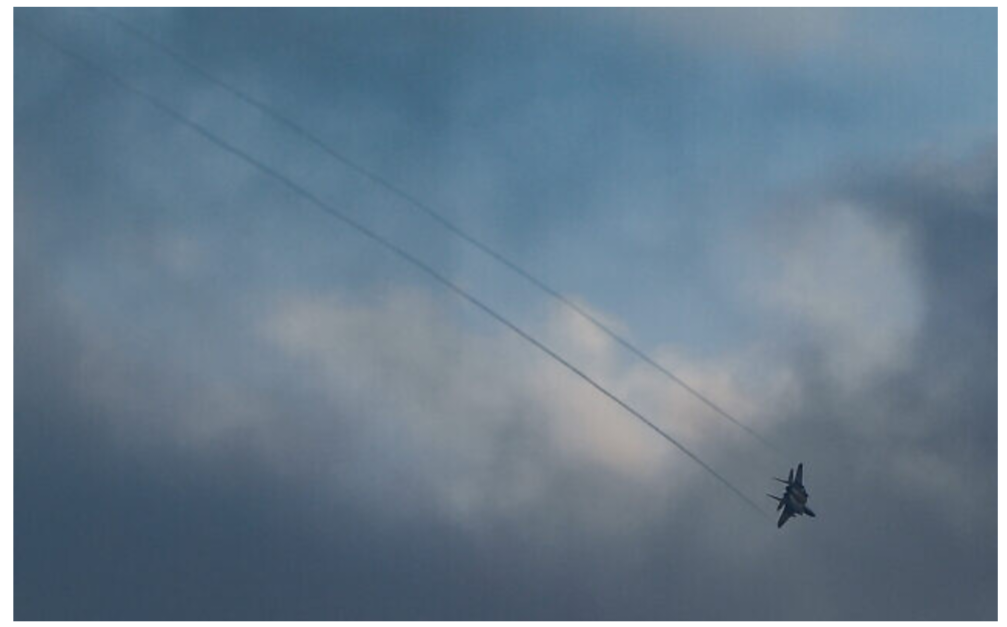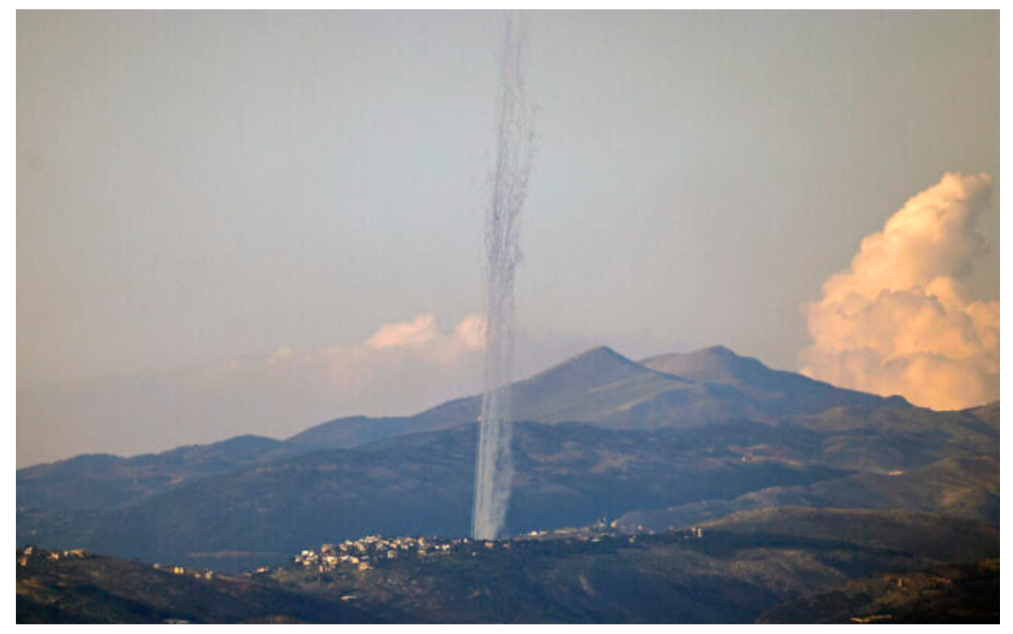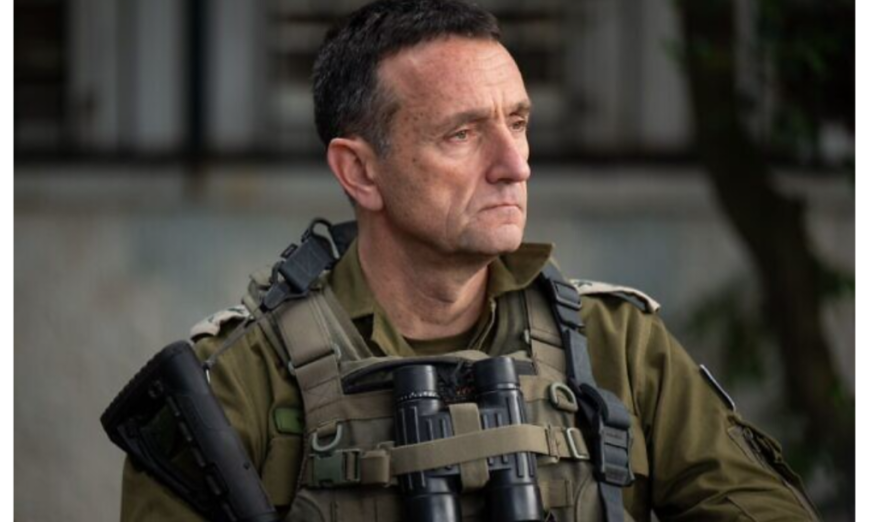IDF Chief of Staff Lt. Gen. Herzi Halevi speaks during an assessment in northern Israel, February 27, 2024. (Israel Defense Forces.)
Hezbollah fires barrage of 60 rockets at Golan; IDF eliminates terror commander.
Israel Defense Forces Chief of Staff Lt. Gen. Herzi Halevi warned on Tuesday that Hezbollah would “pay a very high price” for its continued attacks on northern Israel, as the terror group launched a new barrage of rockets at the Western Galilee while the army’s top general was touring the area.
The volley of rockets came hours after dozens of projectiles were fired by Hezbollah at a sensitive military site in northern Israel, as the terror group continued attacks in response to strikes deep inside Lebanon a day earlier.
“Hezbollah decided on October 7th, in the evening, that it is joining. For that it must pay a very high price,” Halevi said during an assessment in northern Israel, with the chief of the Northern Command, Maj. Gen. Ori Gordin, and the commander of the 146th Division, Brig. Gen. Yisrael Shomer.
Halevi said the IDF was “taking the right steps” to enable some 80,000 displaced Israelis from Lebanon border communities to return to their homes. He said that as a result of the IDF’s actions, “Hezbollah is no longer close to the fence.”
“I think that if we do the right thing, [the residents] will return first of all because of the security. To bring the people back here with security and quality of life, the state will know how to make an effort,” he added.
A barrage of some 20 rockets were fired from Lebanon at the Western Galilee on Tuesday afternoon, according to the IDF, with Hezbollah claiming to have targeted the 146th Division’s base, which is tasked with the area Halevi visited.
It was unlikely Hezbollah knew the army chief was touring the area when it launched its attack on the base, as the visit was only published hours later and the terror group made no mention of Halevi in its statements.
Footage from the rocket attack posted to social media showed rockets impacting close to motorists on a highway in northern Israel.
The clip showed a group of people driving on Route 89 in the Western Galilee, as rockets slammed into the road just a few dozen meters in front of them.

The barrage set off sirens in the communities of Manot, Admit, Avdon, Yaara, Arab al-Aramshe, Hanita, Eilon, Goren, Neveh Ziv, Klil, Abu Snan, Yarka and Amka.
The Iron Dome air defense system intercepted projectiles that were heading toward populated areas.
There were no reports of injuries.
Amid the escalation, the US State Department said on Tuesday that the US does not want to see tensions rise further between Israel and Hezbollah, adding that Israel has assured Washington it wants a diplomatic solution to the issue.
Speaking at a daily news briefing, department spokesperson Matthew Miller said tens of thousands of Israelis in the north faced a real security threat which needed to be addressed and Washington was pursuing a diplomatic path to resolve the issue.
“We do not want to see either side escalate the conflict in the north and in fact,” Miller said.
On Tuesday morning, Hezbollah fired a barrage of some 35 rockets at northern Israel, in what it said was an attack on an air traffic control base atop Mount Meron, in response to Israeli airstrikes on Monday near northeast Lebanon’s Baalbek — the deepest confirmed attacks in years — that killed two members of the terror group.
The IDF said no damage was caused to the base, which is located some eight kilometers (5 miles) from the Lebanon border, in the morning attack.
Later in the day, Hezbollah again targeted the air traffic control base. In a statement, the terror group said it fired anti-tank missiles at the base at around 3:45 p.m., causing damage.
The IDF in the evening hours acknowledged that a missile struck the base, but said that “there was no damage to the site’s capabilities.”
The Mount Meron air traffic control base has been targeted by Hezbollah several times amid the ongoing war, with slight damage caused in one of the attacks.
The IDF added on Tuesday evening that it was striking Hezbollah sites in Lebanon in response to the missile attack and the barrage of 20 rockets on the Western Galilee.
The latest exchanges between Israel and the Iran-backed terror group marked a significant escalation of violence in the already restive northern border region, uncorking fresh war fears after months of steadily rising tensions that have largely been kept in check.
Hezbollah had previously responded to the Israeli strike in Baalbek with a barrage of 60 Katyusha rockets at the Golan Heights on Monday afternoon. There were no reports of damage or injuries in the attack.
Earlier Monday, Hezbollah downed an Israeli Air Force drone, an Elbit Hermes 450 model, over the Nabatieh area in southern Lebanon with a surface-to-air missile. The drones are used by the IAF for surveillance and attacks.
In response to the Monday incident, the IDF said it launched the strikes on Hezbollah’s air defense unit near Baalbek, nearly 100 kilometers (more than 62 miles) from the border.
In addition to the unprecedented strikes in Baalbek, the IDF said it eliminated a senior Hezbollah commander, Hassan Hussein Salami, in an airstrike in southern Lebanon on Monday.
Salami, whose rank is equivalent to a brigade commander, was targeted while driving in the southern Lebanon village of Majadel. The IDF said Salami was the commander of a regional unit in Hezbollah and oversaw attacks on IDF troops and Israeli communities in northern Israel.
Since October 8, Hezbollah-led forces have attacked Israeli communities and military posts along the border on a near-daily basis, with the group saying it was doing so to support Gaza during the war there.
So far, the skirmishes on the border have resulted in six civilian deaths on the Israeli side, as well as the deaths of 10 IDF soldiers and reservists. There have also been several attacks from Syria, without any injuries.
Hezbollah has named 219 members who have been killed by Israel during the ongoing skirmishes, mostly in Lebanon, but some also in Syria. In Lebanon, another 34 operatives from other terror groups, a Lebanese soldier, and more than 30 civilians, three of whom were journalists, have been killed.
Israel has warned that it will no longer tolerate the presence of Hezbollah along the Lebanon frontier, where it could attempt to carry out an attack similar to the massacre committed by Hamas in the south on October 7.
A failure of international diplomacy to force Hezbollah away from the border would necessitate an Israeli offensive, the country has said.

An Israeli fighter jet is seen in the sky following an airstrike in southern Lebanon, February 27, 2024. (Ayal Margolin/Flash90)

This picture taken from an Israeli position along the border with southern Lebanon shows rockets fired from Lebanon into Israel on February 26, 2024.

